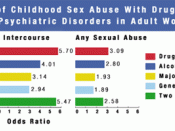Numerous studies have shown that the number of rapes increases as the population increases. However, the rate per 100,000 in the U.S. has increased by 400% since 1960. This produces a double whammy effect. If the population doubles and the rate quadruples, then there are eight times as many rapes. A level 3 sex offender lives a hop, skip, and a jump away from Highland Elementary School. Allowing that to happen is equivalent to letting a recovering alcoholic work as a bartender. Level 3 offenders, being the most serious, are considered a high risk to re-offend, according to police departments and experts who have done research on the topic. To be a level 3 offender, the person has had to offend multiple times, and chances are that there will be a next time. For these reasons, level 3 sex offenders should not be allowed to live wherever they want.
Some say sex offenders have served their time in prison for their crimes and are free by law after they do so. When they are released from prison, nothing prevents them from offending again. Studies have shown approximately 70% of level 3 sex offenders re-offend. Even though the offender might have served his or her time, serious precautions should take place to prevent a sex abuse crime from happening again. Law officials have suggested precautions such as choosing where the offender can't live. Others might say a recently released sex offender has "just had a tough time", and "just wants his or her rights back". When someone takes another's rights away, He or she should not have his or her rights back. The sex offender should have his or her right to choose where to live taken away.
Experts on the subject say the level 3 sex offenders are at a very high risk to re-offend. Allowing them to live wherever they want is unjust and unfair to the people they move in next to. The age of the victims should determine where the offender can live. For instance, if the victim was elementary age, the offender should not be allowed to live anywhere near a school. Sen. Maurice Washington, at a law enforcement meeting, said "We want to keep them away from facilities like child care centers and schools to create a border and keep children safe." He says it's a safety issue for children who could unknowingly be at risk of sex offenders. He explained that students at elementary schools can easily be tempted with candy to climb inside a car, and being so young, they would be defenseless against an adult sex offender.
Having offenders living close can easily make parents of young children feel discomfort. The child wouldn't be able to simply walk down the street without fear of being molested by his or her neighbor. A neighborhood should be a place to feel safe and having a sex offender as a next door neighbor will disrupt that. Inconvenience will effect from that because the parents then will have to drive the child everywhere. The parents would never feel safe allowing their children to play outside. This takes away the childhood pleasures of playing outside, which should be experienced by every child.
Sex offenders should not have the right to live wherever they want. Some states, such as Alabama, already have passed laws designating the places sex offenders can live. They cannot live within 1,500 feet of a school, day care center, park or other place frequently visited by children. Having laws prohibiting where sex offenders can live would save parents discomfort and young children from fear.


